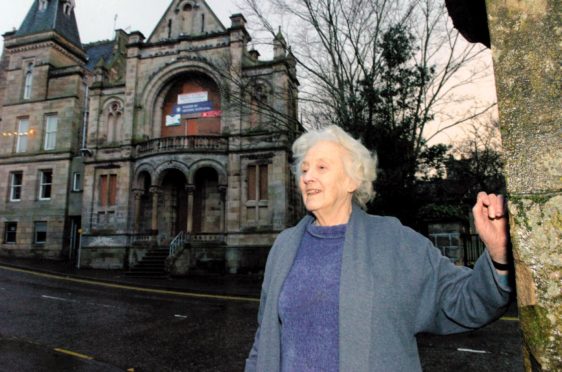A north MP has told how he fears his elderly mother may have been targeted by “relentless” phone scammers prior to her death.
Jamie Stone, Caithness, Sutherland and Easter Ross MP, has called for more to be done to tackle fraudsters online and by phone.
The National Fraud Intelligence Bureau fraud and cyber crime dashboard shows across the UK last year 307,572 reports of cyber crime and fraud were reported – with a financial loss of £1.7billion.
The figures for Scotland show during the same year, 7,279 reports relating to cyber crime and fraud were logged – this amounted to a financial loss of £26.3million.
Mr Stone, the Liberal Democrat spokesperson for Digital, Culture, Media and Sport (DCMS) has urged the UK and Scottish Government to work together to clamp down on phishing scams and the phone equivalent – vishing.
His mum, who had also been involved in setting up Tain Heritage Trust and had also been a community councillor, died at the age of 91 in September 2015.
After the death of his mum, who along with his father Reggie was the founder of Highland Fine Cheeses, took on her phone number for sentimental reasons.
‘Scams of every imaginable sort’
And the scam calls started immediately, lasting for around a year.
Mr Stone, who was elected as an MP in 2017, said: “When she died I took on her old telephone number – then I hadn’t had it a day when these calls started, ‘Can we speak to Mrs Stone?’ They were scams of every imaginable sort.
“I would say no, and we were getting four, five, six calls a day which I never had before on my old number except the occasional one just like I get the odd email.
“This was absolutely relentless, all manner of stuff. From that I derived that she was on a database as someone who was 91 and was vulnerable.
“Obviously this information was being shared. As time went by they stopped – clearly the database was updated.”
‘There’s something quite sinister here’
Mr Stone gave a speech in the House of Commons during a debate on cyber fraud and wants both the UK Government and Scottish Government to do more to protect victims.
He also said the Covid-19 crisis has heightened matters and has created a “climate of fear” for elderly people.
‘My mum didn’t need that’
“I think we shouldn’t underestimate how scary it is for the elderly. I think there’s a quality of life issue here, which is very worrying. Older people, who are concerned about their health and friends, have to put up with a lot and to have an extra source of stress is just not on.
“It’s very easy, if you are a politician, to say ‘this is a problem’ – but this is completely personal – it was my mum.
“I was thinking she must have had these calls until the day she died. She didn’t need that – that was hell.”
“All my mum had was the state pension in her latter years and disability money, when she died there wasn’t much money. You wonder how much money did they take her for?
“I have no way of knowing. I hope they didn’t – but it’s always at the back of my mind as a worry.”
‘We really have to stamp this out’
The National Crime Agency says cyber criminals look to exploit vulnerabilities in order to steal passwords, data and money.
Among the most common cyber threats is phishing where criminals use fake messages to trick people into clicking on links or to give away information.
Those who think they have fallen victim to such scams are urged to report it to Action Fraud for England and Wales.
While in Scotland scams can be reported to Advice Direct Scotland.
Currently there are bills going through the UK Parliament which explore issues surrounding cyber fraud – the Online Safety Bill, the Product Security and Telecommunications Infrastructure Bill, as well as the Telecommunications (Security) Bill.
But Mr Stone says the legislation must empower regulatory bodies like Ofcom and the FCA to properly tackle cyber fraud, and he has called for a taskforce to be set up.
He said: “We have had lip service to something must be done, but what I’m looking for really is a concrete plan coming out of UK Government and the devolved government to say we really have to stamp this out.”
Legislation needs to be ‘water tight’
Mr Stone added: “Scammers prey on our vulnerabilities and they make a lot of money doing it. The Cyber Crime Dashboard shows that millions of pounds are being lost to fraud and cyber crime – and that’s only based on what has been reported.
“The UK Government are bringing forward several pieces of legislation to tackle cyber crime and fraud, but they’re all disjointed and do not properly resource regulators like Ofcom to seek resolution for scam victims.
“Nor has the Scottish Government properly resourced Police Scotland so it can do more to help people identify and report cyber crime.”
‘Scams cause great distress’
A UK Government spokeswoman said: “Mobile phone scams cause great distress for their victims and we are determined to stop these callous criminals.
“Law enforcement partners have stepped up their efforts to tackle this type of crime, taking down thousands of phone numbers as well as fake websites and email addresses.
“We continue to work closely with telecommunications providers, regulators and consumer groups to protect the public from this scourge and we are developing a voluntary charter of the actions telecoms companies will take to prevent fraud.”
And a spokesman for the Scottish Government said: “Scotland’s Scams Prevention, Awareness & Enforcement Strategy was published setting out a shared direction of travel to make Scotland an inhospitable place for scammers where the needs of those at risk of, or who become victims of this criminal activity can best be supported.
“We are engaging closely with a range of key delivery partners including Police Scotland, Scottish Trading Standards and wider frontline advice service providers, advocacy bodies, regulators, UK Government and private sector.
“Despite constraints on Scotland’s public services through a decade of UK austerity, our investment in policing this year increased by £60.5 million to more than £1.3 billion. We have also provided an additional £15 million specifically to mitigate the impact of Covid-19 on the policing budget.
“Police Scotland and the Scottish Police Authority work together to ensure the necessary resources and expertise are in place to tackle emerging areas of threat, such as cyber crime and fraud.”
Find out more about how to spot a scam here.





